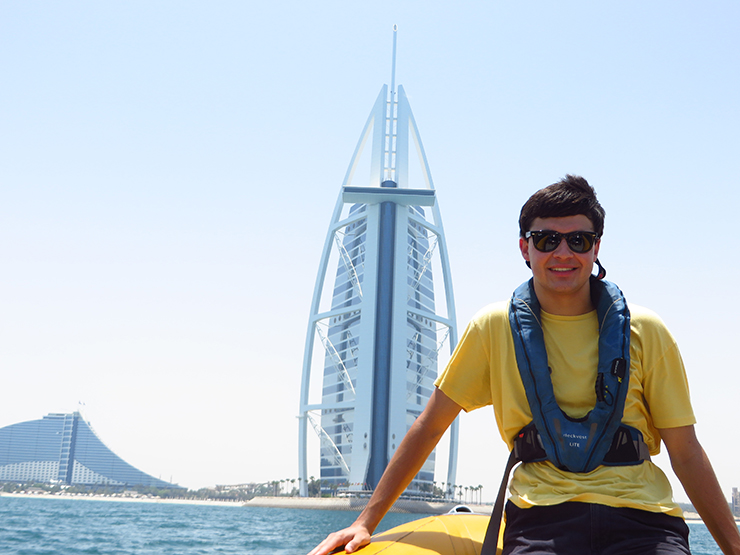 |
| My classmates and I with our hosts in Oman |
Article courtesy of Kristen Coppola, originally published on the Honors College blog in January 2015
Junior Zach Schwermann has majors in International Relations and Middle Eastern Studies and has tacked on two minors as well – Arabic and International Business. So it makes sense that he would be drawn to the Intensive Arabic Language Seminar in the United Arab Emirates. Along with a better knowledge of speaking Arabic, Zach learned a lot about the culture of the Middle East, including how U.S. food chains adapt to meet Islamic dietary restrictions and how Muslims celebrate their holy days.
Hot, sandy and dangerous; these are all stereotypical adjectives that people use to describe the Middle East. While some of these are indeed true (I experienced 112 degrees Fahrenheit once or twice!) some of them aren’t (Dubai has a lower crime rate than most modern, Western, industrialized countries). My experiences while studying abroad in the United Arab Emirates allowed me to confront these stereotypes first hand, and by doing so I was able to greatly expand my understanding of the Middle Eastern way of life and the people that live it. My name is Zach Schwermann, and I received the Honors College Study Abroad Grant, which helped to fund my study of the Arabic language at the American University of Sharjah, in Sharjah, UAE. Prior to my trip, I had studied Arabic at the University of Arkansas since my freshman year, but this seven-week trip allowed me to grow my understanding of both the language and the people who speak it more than the prior two years at Arkansas had, combined.
 |
| Myself and my fraternity’s flag (Kappa Alpha Order) in front of the main administrative building at the American Univeristy of Sharjah |
In addition to the reduction in the usage of pork, Islamic culture was very prevalent during the holy month of Ramadan where Muslims fast from sunrise to sunset. The month of Ramadan is one of the most important times during the Islamic calendar, so the rules of fasting were taken very seriously in a country that was usually very relaxed to the often non-Islamic, Western ways. While it was still possible to find places to eat and drink during the day, they were often fenced off and hidden from public view, which was a very weird feeling in a mall food court that is usually very open and bustling with people. Another cultural aspect that was different from America was the large variety of people from all around the world. Throughout my trip I counted, hearing 12 different languages ranging from Urdu (a Pakistani language) to Russian. Urdu was surprisingly the third most-used language in the UAE (following English and Arabic) and was the foreign language I encountered the most while abroad. This is because most of the blue collar work force, of taxi drivers and restaurant workers, come from Pakistan and often knew only Urdu and broken English. However, this did not hinder my ability to grow in my Arabic language skills, because I still found many opportunities to speak the language outside of class.
 |
| In front of the world’s most expensive hotel, the Burj Al Arab |
While the experiences I had there were limited to a finite time period, the lessons I learned gave me an infinite amount of possibilities of how I can further expand my understanding of the Middle East and hopefully be able to go back, either during college or afterwards for a job opportunity.
--
For the full article and more information about scholarships for international
travel through the Honors College, please visit the HonorsCollege blog.
Learn more about studying abroad through the Middle East Studies department at: http://cavern.uark.edu/rd_arsc/mest/4777.php
